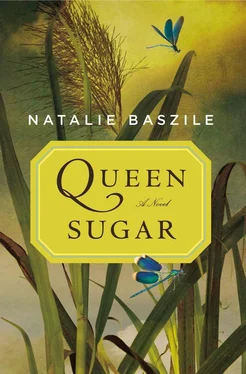“I’ll do the first batch, then I’ll let you run with it.”
Ralph Angel watched as Johnny dumped a sack of flour into the big metal mixing bowl, then peeled the lid off the first garbage can, labeled MALT, and dipped a ladle into the dark syrupy liquid. He used a big scooper to measure out the salt and yeast, then poured in a pitcher of warm water and flipped the switch.
“It looks simple, and it is, as long as you get exactly the right amount of each ingredient. Screw up the proportions and that’s eighty dollars’ worth of product down the drain. After you put everything in, run the mixer for fifteen minutes, then take the dough over to the table. Billy will take it from there. Questions?”
“I got it.”
Ralph Angel stood silently by the mixer while the paddle turned a figure 8 in the big stainless steel bowl, and the radio played, and the guy named Joe lined the long wood boxes with canvas while Johnny fired up the ovens. As they worked, the men teased each other like brothers, lobbing curses and light insults across the bakery floor, and it struck Ralph Angel, standing alone, that he’d never had that; had never worked with people he liked and who liked him enough to joke around. Gwenna had been the only person, but she was gone. He’d thought he might be able to have that with Hollywood — they used to joke around all the time when they were kids — but Hollywood didn’t seem interested lately. Was always saying he had to work. It would be nice, for once, to be in a place where everyone was friends.
• • •
Three hours of mixing. Through the windows, the darkness seemed less dense. There was a hint of sunrise. Ralph Angel hauled the last batch of dough over to Billy, who reached his tattooed arms — Ralph Angel could see the designs and dark outlines under the layer of flour — into the metal mixing bowl and, with his bare hands, scraped the tacky glob onto the wooden table. He watched as Billy pulled off softball-size chunks of dough, ran them through the breaker to squeeze out the air bubbles, shaped each chunk of dough into a circle, then went back and formed the circles into perfect oblong loaves and laid them side by side in the long wooden boxes. Johnny was right. It was an art.
“How many loaves do you get from a batch?” Ralph Angel said, in a friendly tone. He leaned against the table.
“’Bout fifty.” Billy didn’t look up; his hands never stopped moving. “But they gotta rise for two hours in the proof boxes before we can bake ’em.” He nodded to the wood boxes stacked ten high under the window. “The second batch over there is about ready.”
Across the floor by the ovens, Johnny was baking the last of the first batch. Inside the oven, the rotisserie shelves revolved like seats on a Ferris wheel, and Johnny had just enough time to lift raw loaves out of the proof boxes and arrange them on each shelf before it was out of reach. By the time the shelf circled around and appeared again, the loaves had baked to the gold of dark honey, and Johnny lifted them out and slid them onto the cooling racks.
“What can I do?” Ralph Angel said, thinking he could do what Johnny was doing.
“Take those boxes over to the ovens.” Johnny pointed to the stack of wooden proof boxes. “But be careful, they’re heavier than they look.”
“I’m on it.”
It was hot in the bakery now with the ovens going full blast. Ralph Angel had already loosened his tie, unbuttoned his shirt, but sweat still trailed down his face. At the window, he stood on his toes to reach the top proof box. He lifted it from the stack, but stumbled backward. The box was awkward to carry at nearly six feet long, tall as a man, and heavier than it looked, loaded from end to end with balls of dough. Worn smooth as river stones from years of use, the sides of the box were hard to hold, and as Ralph Angel struggled to get his grip, the box fell forward and the front end crashed on the floor. Everything seemed to move in slow motion then. Ralph Angel felt himself reaching for the loaves as they slid on the strip of canvas, tumbled out of the box, and lay on the floor in a soft, doughy heap. He felt the box slip out of his grasp completely, and watched it knock against others. He saw the tower of proof boxes waver, then topple like Fiddlesticks.
“Whoa!” Johnny yelled, rushing over. “Lord Almighty,” he said, grabbing his hair in his fists. “My orders!”
But it was too late. Nearly a hundred loaves lay scattered and smashed across the floor.
• • •
The red light over the bakery door wasn’t on yet and Main Street was quiet and still as Ralph Angel drove back to Miss Honey’s. Three little girls waved from the bed of an old pickup as Ralph Angel passed; an old man dressed in a brown striped suit and freshly shined shoes moseyed down the empty sidewalk. Ralph Angel had offered to stay till they made fresh batches to replace the ones he’d destroyed, but Johnny had declined his offer. They’d have to work double-time to get all the orders out, Johnny said; Ralph Angel would just be in the way. Johnny offered to pay him for the hours he worked, but as much as he needed it, Ralph Angel couldn’t accept the money. Even though it wasn’t the kind of work he’d wanted, the hours he’d spent in the bakery had reminded Ralph Angel how good it felt to be needed, to be productive. Everyone needed to feel that their days had purpose, that they were moving forward.
There wasn’t room for a car to stop on the high bridge, but since it was still early and no cars were coming, Ralph Angel stopped anyway. He stood at the guardrail and looked out over the cane fields, stretched out like a soft green carpet in the morning light, and the bayou sliding beneath him. It was a long way down. He thought again about how that man on the bike must have felt, falling through the air, then hitting the water. Was he surprised to discover he was alive or had he always known he would survive? Ralph Angel thought back to that terrible moment when Blue fell into the barge slip. He’d thought he would die and he’d felt — he’d felt relief that it would all finally be over. Almost wished it could be so. But then he’d thought of Blue, all alone in the world, and it had been enough to make him keep going. He had to keep going. Somehow.
Ralph Angel pulled his tie from around his neck, took off his shirt. For a long time, he stood there on the bridge in his undershirt, feeling the morning air against his skin. He held his new clothes over the rail until the breeze came up from underneath and then he stood there watching as they drifted down to the bayou.
August now, 5:30 a.m., and the temperature was already in the high seventies with 86 percent humidity. This late in the summer, anyone with money had escaped the asphyxiating heat and fled to coastal Florida — but not cane farmers. Because planting season had begun. There was no time to rest. And so, under a dawn sky aglow with misty pinks and purples, Charley, Denton, and Alison hitched planter wagons to tractors for the first day of planting, while crews of laborers — black locals and Mexican migrants up from Guanajuato — gathered around Denton’s pickup, waiting for instructions.
“Do we really need all these men?” Charley asked. “Isn’t there some machine we can rent that plants cane? Because my labor costs are going to shoot through the roof.”
“There’s no cane planting machine that I know of,” Denton said. “And if there was, we couldn’t afford it. You gotta trust me. Planting by hand is the way to go. Has been for the last two hundred years.”
Since cane grew from cuttings rather than seed, they had to cut some of Charley’s premium cane in the second quadrant that would ordinarily have been harvested—“mother stalk” Denton called it — and replant it in the freshly cultivated fields.
Читать дальше












